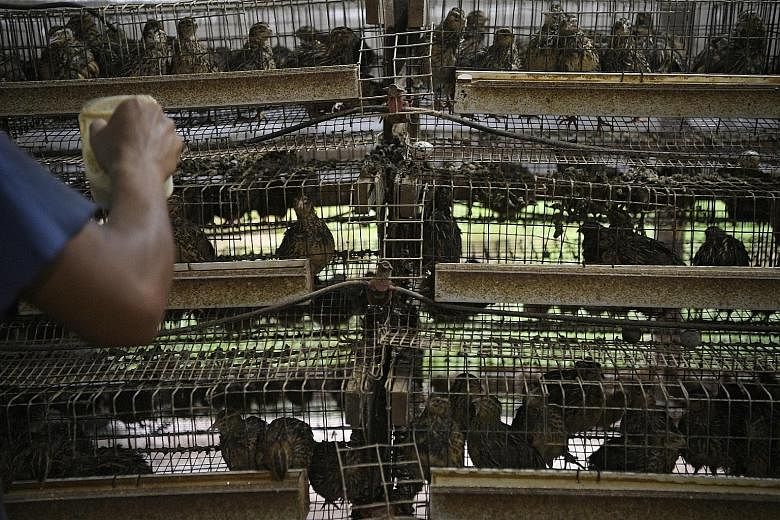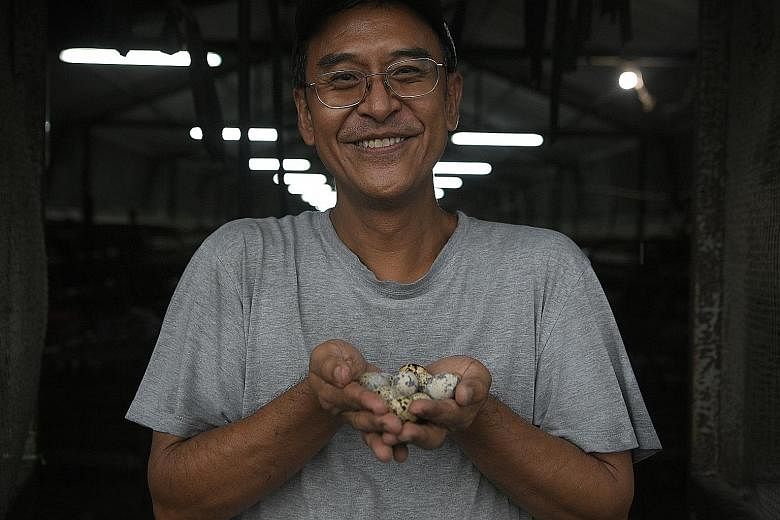In the face of a global spread of antibiotic resistance, the Agri-Food and Veterinary Authority of Singapore (AVA) will be ramping up the monitoring of resistant bacteria in livestock reared at local farms.
This is because antibiotics fed to animals can end up affecting human health upon consumption.
The authority said it is expanding its surveillance programme in phases to all animal production sectors, including farms rearing fish, cattle and goats. Besides the animals themselves, their products, such as milk, will also be monitored.
Currently, the agency's surveillance focuses on food-borne pathogens, such as salmonella, in local layer hen farms.
For a start, AVA has expanded its surveillance since last month to other poultry and ruminant farms such as those rearing goats.
The move follows the launch of the National Strategic Action Plan on Antimicrobial Resistance (AMR) by Senior Minister of State for Health Lam Pin Min last month.
The plan covers a broad range of areas, from medical prescription of antibiotics and public education to better monitoring at local farms.
It was drawn up by an inter-ministerial committee - the first time the Singapore authorities joined hands to provide a whole-of-government effort to tackle antibiotic resistance.
The World Health Organisation in October also put forth recommendations for farmers worldwide to halt the use of antibiotics in healthy animals. It said the overuse and misuse of antibiotics, not just in humans but also in animals, are worsening the threat of antibiotic resistance.
In response to queries, the AVA said it will also extend surveillance of AMR bacteria in both imported food and local farms to include bacteria such as E. coli. However, it said there are existing regulations in place at local farms to prevent the unnecessary use of antibiotics.
"In Singapore, AVA has banned the use of certain antibiotics in food-producing animals, and antibiotics are not allowed to be used for promoting growth of animals," said a spokesman.
"Farmers who use antibiotics in their animals are required to observe a certain time period before the animals or animal products can be slaughtered or sold," he added.
Only in some cases, such as when there are bacterial infections in animals, can farmers apply antibiotics.
But imported meat and eggs may not be antibiotic-free, though the level of these chemicals are tested and monitored by the AVA.
Nanyang Technological University Food Technology Centre director Jorgen Schlundt said antibiotic resistance can be caused by overuse of such medication in farming and agriculture.
As microbes become increasingly resistant to antibiotics, even minor illnesses can be a threat to human life. Today, the problem kills about 700,000 people globally each year, noted Professor Schlundt.
"Resistant bacteria are additionally dangerous because when you get sick from them and the medical doctor gives you an antimicrobial to cure you, that antimicrobial might not work," he explained.
Local farmers say not using antibiotics has come at some cost.
Said Mr William Ho, 51, owner of Lian Wah Hang Quail Farm at Lim Chu Kang : "Even though not using such medication does raise our operation cost by about 15 per cent, the knowledge that the eggs we sell are good for the public is worth it."
He added that imported eggs may not be antibiotic-free, while local produce will more likely be.
Maintaining a clean environment has also aided farmers in doing away with antibiotics.
Mr Eric Ng, 44, group chief executive officer of Apollo Aquaculture Group, said he uses "several technologies to ensure that the water our fish live in is cleaner and therefore less likely to lead to disease".
Local egg-farming giant Seng Choon Farm said basic hygiene practices such as hand washing, disinfection procedures and pest control are as important on the farm as in a hospital. It also employs vaccinations, prebiotics, probiotics, phytogenics or other natural ingredients to boost the birds' immunity.



